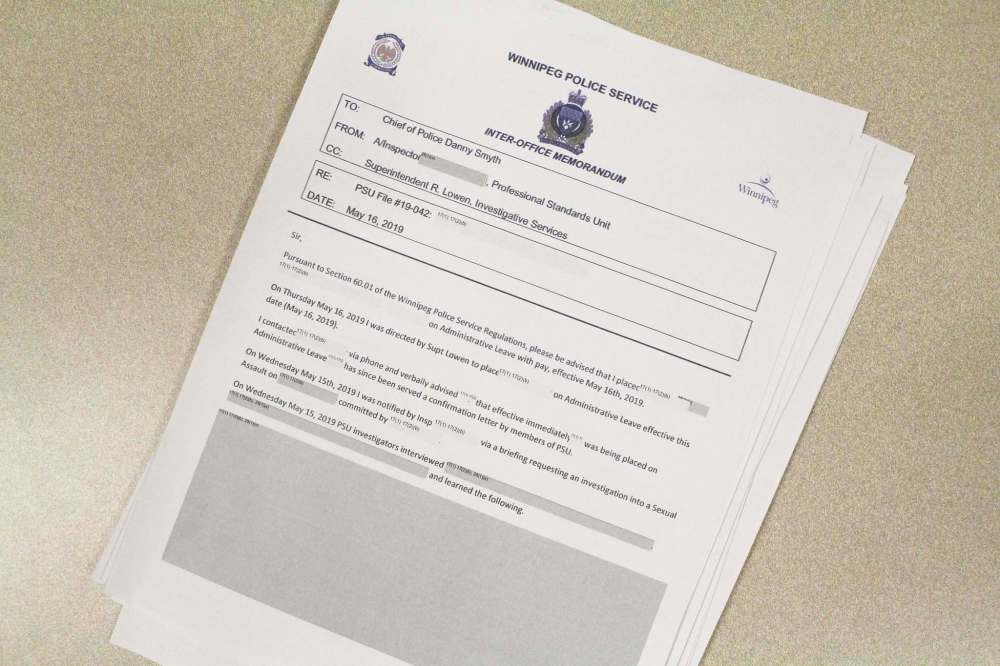Legislation leaves no latitude for IIU reporting
Read this article for free:
or
Already have an account? Log in here »
To continue reading, please subscribe:
Monthly Digital Subscription
$0 for the first 4 weeks*
- Enjoy unlimited reading on winnipegfreepress.com
- Read the E-Edition, our digital replica newspaper
- Access News Break, our award-winning app
- Play interactive puzzles
*No charge for 4 weeks then price increases to the regular rate of $19.00 plus GST every four weeks. Offer available to new and qualified returning subscribers only. Cancel any time.
Monthly Digital Subscription
$4.75/week*
- Enjoy unlimited reading on winnipegfreepress.com
- Read the E-Edition, our digital replica newspaper
- Access News Break, our award-winning app
- Play interactive puzzles
*Billed as $19 plus GST every four weeks. Cancel any time.
To continue reading, please subscribe:
Add Free Press access to your Brandon Sun subscription for only an additional
$1 for the first 4 weeks*
*Your next subscription payment will increase by $1.00 and you will be charged $16.99 plus GST for four weeks. After four weeks, your payment will increase to $23.99 plus GST every four weeks.
Read unlimited articles for free today:
or
Already have an account? Log in here »
Hey there, time traveller!
This article was published 16/07/2019 (2339 days ago), so information in it may no longer be current.
There’s a reason all accusations of criminal wrongdoing against police officers must be reported to Manitoba’s law enforcement watchdog. It’s to ensure those cases are properly investigated and are free of police bias.
It’s the whole point, in fact, of having an Independent Investigation Unit, a provincial body that is supposed to investigate — or at least monitor — all allegations of Criminal Code offences against Manitoba police officers.
Unfortunately, it appears the IIU — a relatively new body — is not always upholding its responsibility to provide that legislated oversight. And the Winnipeg Police Service is not adhering to its duty to report all allegations of criminal breaches to the IIU.

A series of Free Press reports has uncovered how an allegation of sexual assault against a Winnipeg Police Service officer in February was not — as required by law — brought to the attention of the IIU. Worse, the IIU — in a written statement to the Free Press — says there are many cases, in which police officers are accused of a criminal offence, that are not reported. Police officials explain that if an internal preliminary investigation concludes that an allegation is unfounded, there is no obligation to report it to the IIU. That was the case with the accusation of sexual assault earlier this year, police say.
However, that position contradicts Manitoba’s Police Services Act.
Sec. 73(1) clearly states that when a police service receives a formal complaint that one of its officers “has engaged in conduct that constitutes a contravention of the Criminal Code,” or any other federal or provincial law, the police chief must notify the IIU.
It appears the IIU is not always upholding its responsibility to provide that legislated oversight.
The IIU is not required by law to investigate all cases in which police officers are accused of a criminal offence. Only the most serious ones prescribed under the act — including homicides and those resulting in serious injury — must be investigated directly by that office.
However, all others must at least be reported to the IIU, which can request detailed information about a case and assume conduct of it for any reason.
But the IIU can’t monitor a case it isn’t aware of. Which is why police are required by law to notify the IIU that a formal complaint has been made, regardless of the merits of that allegation.
The requirement is not discretionary. Nowhere in the legislation is there an allowance for a preliminary screening of an allegation by police to determine whether it should be reported to the IIU. That would undermine the purpose of the act.
The creation of the IIU came in the wake of a commission of inquiry into the death of Crystal Taman, who was killed by off-duty Winnipeg police officer Derek Harvey-Zenk in 2005, when he slammed his vehicle into hers at a red light. The inquiry found the police investigation into Taman’s death was botched and tainted with police bias.
The inquiry’s commissioner, Roger Salhany, said the Taman case epitomized why it is “intolerable” to have police investigating police in criminal matters. He recommended the creation of an independent body to investigate “any alleged criminal activity of a member of the police service,” not just some of them.
While the new policing act does not go as far as Mr. Salhany recommended, it does require law enforcement agencies to at least report all allegations to the IIU.
Both the WPS and the IIU have been derelict in their duty to adhere to that legal requirement.











